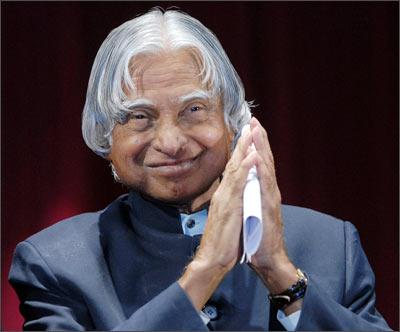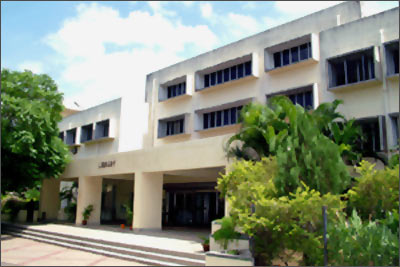 | « Back to article | Print this article |
'A clear aim, knowledge, hard work and perseverance spells success'
A vibrant octogenarian -- that's what describes Dr Kalam best. For a man of 80 summers, Dr Kalam is extraordinarily full of life even at 8.15 pm when we sat down for a freewheeling chat, nay an experience. We ask him about his famous 'thinking hut' at Rashtrapati Bhawan.
"It is a great place," he says. "Two books came out of there. Here, I don't have sufficient area -- but everywhere I capture thoughts." His infectious enthusiasm overpowers us all as we hear him talk about how to live a life to its fullest
possible potential. Here are the excerpts of his interaction with Team Careers360.
Q. Sir, you always say that we must dream big and follow our dreams. What makes one follow one's own dreams?Parents, access or commitment?
A. Dreams are finally nothing but goals or mission in life. In my case I had great teachers in various phases of life. And also my parents, my father and mother were very useful teachers to me throughout their lives. I was the only fellow in the family studying, and their commitment to me was absolute. The spiritual environment at home shaped me. You should convert your goals and mission to success in spite of problems. That is my lifelong commitment.
Q. Sir, what is more important, the ability to handle failure or the ability to respond to failures?
A. Of course, I have myself gone through many successes and a few failures. And I have also met a number of successful people throughout the world wherever I have gone, and when I discuss with them, they reveal how many problems they have encountered, what kind of failures they have had. So, I have come to the conclusion that great success has some element of failure also. I still remember Prof. Satish Dhawan, he gave me a project in 1973, were you born then?
Careers360, is a complete career magazine.
'...if you don't do any work, you don't experience any problem'
Q. I was born in '73.
A. (A burst of laughter) He gave me the SLV project in 1973, and named me the project director. I found that there were a lot of senior people above me, you know, experienced people, they should support me and there were a number of youngsters with high technical knowledge. So, I had to bring them all together to succeed. At that time I was in my thirties, 39 or 40. So, I was frightened, whether I can do it. It's a great job, how can I do it for the first time, how to build a rocket, to make a satellite, and it's a big vision and how can I do it?
Q. And the nation's expectations were on you?
A. A lot of expectation. So then Prof.Satish Dhawan, the chairman saw my hesitation. He called me and gave me some advice, famous advice. He said, "Kalam, if you don't do any work, you don't experience any problem." Even in media, if you don't report there is no problem. If you report, problem starts. (He laughs heartily at this). So, Prof. Dhawan said major programmes are always coupled with major problems. But don't allow problems to become your captain, you should become the captain of the problem. Defeat the problem and succeed. This advice he gave me in 1973, even now it's true. It is true for politicians, educationists, media people, it's true in every area. So, the message I'm giving is we should take control of the problems, okay?
Q. Sir, why do we find 2/3 of India's engineering graduates unemployable? What do you think is the underlying problem?
A. During my recent visit to CanadaI visited a university called Waterloo. For an engineering degree students are taught in the classroom for one year, the next year they go to the industry. So two out of four years they spend in the industry. And in the industry they learn to work within the system, it may be the software system or the hardware system, machine system, electronic system, or chemical system. But they learn to apply what they studied at the university. So when they graduate there is good demand for them. They can hit the ground running.
'It taught me the value of planning, of teamwork, of time'
Q. So, it is lack of integration between real-life work and academia that is the problem?
A. I want to share with you my own experience. In 1957 I studied aeronautical engineering in Madras Institute of Technology. It was a difficult discipline to get into and we were only nine students. Now, Prof. Srinivasan gave us a six months project in our final year. The project was to design low-level (low altitude, he clarifies) attack fighter aircraft. So, having studied, aerodynamics, structures, propulsion, control, etc., here we have to put them together into a workable aircraft system design. I was the project leader for that. I was the ninth, so eight other people are there, someone would give propulsion, some other aerodynamics etc. So, after fourand-a-half-months of study, I was there in my laboratory. The teacher, my guide comes. At that time we did not have computers, I was using the design board for drawing the design of the aircraft and my friends were all around me. So, he comes and sees and says, "I'm completely disappointed with your work; I am going to stop your scholarship if you don't complete the design in two weeks time." (Dr Kalam laughs.) It was a verycostly education, if my scholarship stopped, I had to return home. I talked all kinds of things, gave him excuses, told him we had worked so hard, all of us are suffering etc. But to no avail. And so, finally all of us joined together day and night, Saturdays, Sundays; we didn't even go to our hostels. And we designed the fighter aircraft. On a Sunday evening Prof. Srinivasan came, exactly one day before the deadline. He saw the design, he was very happy. Then, he gave us Madras coffee in his house. (Dr. Kalam laughs again as he remembers).
It taught me the value of planning, of teamwork, of time. But what we learned most out of that is that in the education system, while we study mechanical engineering, electrical engineering, chemical engineering etc. we should also have a clear understanding of how it all fits into a larger system, a productive system. So students must also be taught system design, system integration, system management, since that is what the industry wants. Our educational system should promote that.
Q. Why, sir, is entrepreneurship and skill development very important to you?
A. We add seven million people every year at 10+2 level and three million graduates every year. So, we inject ten million people into the society every year as employment seekers. This is because entrepreneurship is not taught, either in the secondary school education or in higher education or university education. Entrepreneurship is not part of the curriculum, neither is acquisition of usable skills. That's why I'm saying if 30 per cent people have to procure their skills, that training should be started during the period of education itself.
Q. Sir, what would be three qualities which you think one requires for success in life?
A. I will say four qualities, okay. Number one, a clear aim in life, without it you will be going in all directions. Second, you should acquire the knowledge. You acquire knowledge in multiple ways. Great books should be your friend, great
teachers should be a friend, and even home environment and parents can help you gain knowledge. The third aspect is hard work with devotion. I am saying since your work is towards your mission, it should be permeated with the devotion to that mission you have in mind. And the fourth one is perseverance. Persevere continuously. You do these four things and you can become anything. All these four things you have, work for it, you will achieve anything.
'Report the success story of a fisherman, an agrofood processor, a farmer, a craftsman'
Q. Sir, would you then say, that it finally boils down to focusing on one mission in life?
A. No, it is finally that the goal should be in front of you. That is my experience. We are always tempted to do many things simultaneously. But if you start doing one thing, have one goal and put all your efforts into that, then definitely you will succeed. Of course, you have to win! A problem always appears here and there but you have to face the problem and defeat the problem.
Q. Sir, how do we, at Careers360 add better value for our readers?
A. You should not become just like any other magazine. You see 700 million people are living in the rural area, you are reporting about 300 million people. So you should report the success story of a fisherman, an agrofood processor, a farmer, a craftsman. The message is become the magazine of a billion people population.
Q Sir, one last word to our readers.
A. They must think in a big way. I remember 2000 years back, there is a famous saying in Thirukural by Saint Poet Thiruvalluvar -- Vellathanaythu Malar Neetam Mandartham Ullathanaytu Uyarvu. It means that, just like the height of the water in a pond determines the height to which a lily would grow, it is the heights of thoughts that determines the heights to which you could aspire for. So as human beings they should have great thoughts, great aims, and when thoughts become transformed into actions performed with perseverance and devotion, success has to follow. Thank you very much sir.



